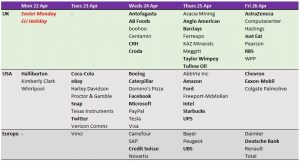This report is not a personal recommendation and does not take into account your personal circumstances or appetite for risk.
Results season is upon us again. Time for a refresher on corporate lingo. Management verbiage can be a minefield for retail investors. Next time you read about business performance, I hope this will make things clearer.
Sales, revenues and profits sound so very impressive when described in their millions, if not billions. But what’s more important for share price sentiment tends to be growth. This is the change since the prior quarter and/or the same quarter last year. But not just any old growth.
 “Reported” growth of 10% can look equally impressive, but may be flattered by big changes in business operations. If sales or profits growth jumps from 1% to 10% just because of a single big contract, this disguises the still pedestrian growth of the rest of the business. So look out for underlying, organic and like-for-like growth.
“Reported” growth of 10% can look equally impressive, but may be flattered by big changes in business operations. If sales or profits growth jumps from 1% to 10% just because of a single big contract, this disguises the still pedestrian growth of the rest of the business. So look out for underlying, organic and like-for-like growth.
Similarly, a company’s sales or profits could double because it acquires another company, however, the real growth of both the original and acquired business could be rather less impressive. Pre-exceptional or adjusted growth strips out these changes to highlight the true rate of growth.
Only this morning pest control expert Rentokil Initial published Q1 revenue growth +10.6% versus Q1 last year, of which 4% was organic and 4.9% from acquisitions. Proof that both numbers are required for the real picture. The shares? Up 2% today in reaction.
Another fine example comes from the Retail sector. Here companies tend to publish same store sales growth or like–for-like (LFL) growth. This includes only those stores open for the whole period, highlighting only the sales/profits growth from the existing shop base, excluding new openings.
For fast growing brands, new openings can significantly distort things. They can hide a slowing contribution from existing stores, and this can be a real worry for investors.
Furthermore, companies which trade round the world can be highly sensitive to currency moves. You may hear CEOs talk about growth on a constant currency basis or excluding currency movements. This lets investors know how the business fared excluding the artificial flattering or hindrance from currency moves.
If revenues or profits are up only because your sales are worth more in GBP, thanks to a weakening of the pound, this means sales growth is actually flat. Something perhaps worth keeping an eye on, especially if the pound begins to strengthen significantly.
Coming back to Rentokil, revenue growth of 10.6% since Q1 last year was in fact 8.9% at constant FX. This implies a near 2% boost from a weaker pound. Shareholders are sure to watchful of any further strengthening by Sterling against global currencies like the US Dollar.
 Our Week In Advance already shows another raft of big name companies reporting results next week. Even if shortened by Easter.
Our Week In Advance already shows another raft of big name companies reporting results next week. Even if shortened by Easter.
Think investor favourites like Antofagasta, AB Foods, Anglo American, Barclays, Taylor Wimpey, Tullow Oil, AstraZeneca and RBS.
And that’s just on the UK 100 ! Plenty to get excited about with share price moves of up to 10% feasible if the news is big.
And each day next week we will include in our Morning report a paragraph per company reporting. Because companies will do their utmost to to highlight all the “good”; our job is to highlight the good and “uncover” the bad. To make sure you know about both, get access to our Research Gold Pass.
You’ll also receive a selection of daily trade opportunities. These include names scheduled to report results; shares which could bounce; those trading within in a range; those on a breakout and/or gathering momentum.
Whichever name or strategy type takes your fancy, allow us put some put some quality ideas in front of you.
Enjoy your long weekend.
Mike van Dulken, Head of Research, 18 Apr 2019
This research is produced by Accendo Markets Limited. Research produced and disseminated by Accendo Markets is classified as non-independent research, and is therefore a marketing communication. This investment research has not been prepared in accordance with legal requirements designed to promote its independence and it is not subject to the prohibition on dealing ahead of the dissemination of investment research. This research does not constitute a personal recommendation or offer to enter into a transaction or an investment, and is produced and distributed for information purposes only.
Accendo Markets considers opinions and information contained within the research to be valid when published, and gives no warranty as to the investments referred to in this material. The income from the investments referred to may go down as well as up, and investors may realise losses on investments. The past performance of a particular investment is not necessarily a guide to its future performance.
Prepared by Michael van Dulken, Head of ResearchComments are closed.
Accendo Markets is an award-winning provider of CFD and spread betting trading services. We provide an execution-only service.
Telephone calls and online chat conversations may be monitored and recorded for regulatory and training purposes.
* We provide these as underlying assets to CFDs and Spreadbets.
To view our policies and terms, please click here
This website is not intended for or directed at residents of the United States or any country outside the UK. It is not intended for use by or distribution to any person in any jurisdiction or country where its use or distribution would contravene any regulation or local law.
Prices on this page are delayed.
Like many websites, we use cookies for statistical purposes and to acquire information on general internet use. This helps ensure that you get the full benefit of our services, and enhances your browsing experience . For more details on the cookies we use, view our privacy policy under the heading 'How We Use Cookies'. By using this website, we'll assume that you're happy to receive all cookies from Accendo Markets.
Removing cookies may impede the operation of some parts of this website. For general information about cookies and how to remove them, please click here
